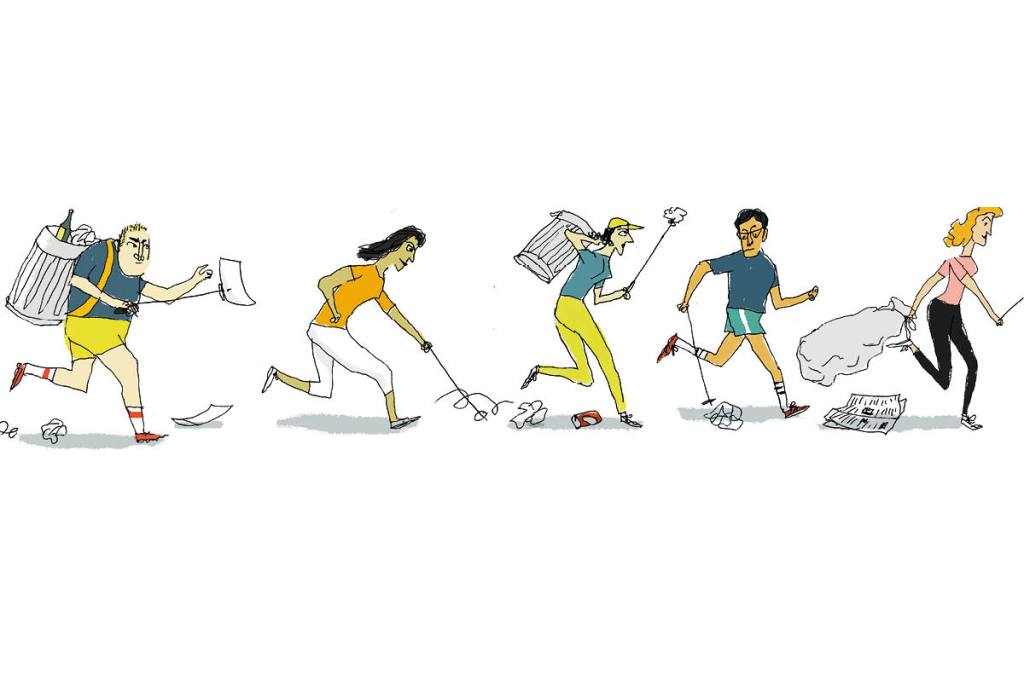The first finisher crossed the line sweaty, tired and almost black with dirt, his white Decathlon shirt turned gray and his standard-issue blue gloves transformed into a deep midnight. He dragged behind him a refrigerator-sized plywood box, piled high with swollen rubbish bags and secured with a hooked rubber bungee cable — where he grabbed that, nobody knew. Yet José Luis Sañudo Lamela’s smile was wide, and he laughed heartily when onlookers and fans expressed amazement at his feat.
But despite Lamela’s assuredness that he would take home top billing in the annual World Plogging Championships, one man outdid him — if not in diversity of goods, in pure heft. Manuel Jesús Ortega García, a Spanish plumber, might not have been the fastest, but on his person he carried a dishwasher, a propane tank, a fire extinguisher and a host of other odds and ends — all in all more than 300 pounds of trash.
Not to be undone, other top finishers, such as Renato Zanelli and Elena Canuto, the 2022 champions, crossed the finish line with rusty irons hanging from their necks and chairs dangling from their arms, while pushing tires and dragging disused televisions and 1980s boom boxes. “The competition is intense this year,” said Zanelli, seventy-one, whose knack for locating refuse, in addition to his training, keeps him competitive against ploggers half his age.
Lamela, Ortega, Canuto, Zanelli and about sixty others from sixteen countries descended on Genoa, Italy, in late September to put their refuse-hauling regimes to the test in the World Plogging Championships, an annual race that combines running with trash collecting. For six hours contestants collected points by not only tallying miles and vertical distance, but also by hauling the heaviest and most valuable trash across the finish line — recyclable and fixable materials bringing in the top points. In one afternoon, athletes ran about 820 miles across Genoa, gathered about 6,600 pounds of trash and helped recycle more than 4,400 pounds (71 percent of the total amount) — equaling about 37,000 miles or fifty flights between Milan and Rome in carbon offsets.
“The quantity of collected waste has tripled since the last championships,” said Roberto Cavallo, the World Plogging Championship director. “The runners always manage to surprise us.” Cavallo, who is on the world organizing committee of plogging, knows his rubbish. The founder of Keep Clean and Run, an eco-marathon in which the plogging takes place in stages over a week, Cavallo and his partner Vitor Pereira have run nearly 215 miles crossing Trentino, Brescia and Bergamo, collecting abandoned waste found along the way, supported by citizens and students from thirty-eight municipalities across the region. “Sports, once again, has proven to be a useful vector of messages: a jog with a waste bag is enough to set an example of respecting our planet more,” he said.
Although it sounds like something done in the privacy of one’s home, plogging is actually a dictionary-recognized portmanteau coined by a Swedish environmentalist and runner named Erik Ahlström who in 2016 combined the Swedish phrase “plocka upp,” which means “to pick up,” and the English verb “jogging.” Ahlström had been shocked by the amount of debris he saw on the road during his daily cycling workout. So he started picking it up, and then he convinced his running club to take a day each week to pick up trash. “Rubbish and litter creates not only a dirty surrounding but also an anti-social one that distances us from one another,” Ahlström said. “We in Sweden with our clean water and fresh air should also be an example for a clean environment; zero tolerance to garbage should be a matter of course.” The Swedish plogging spread to other countries — even as far as the West Bank of Israel — and other clubs, including the Right to Movement Palestinian Runners, established their own plogging events. The growth of the movement spawned an idea: what if plogging turned into a competitive sport?
I traveled to Genoa — the site of the 2023 race, to find out. While Italy is known for its significant beauty, the country struggles with chronic littering, inefficient garbage collection and illegal dumping in the mountains, especially in the north. Rome has become symbolic of Italy’s inability to fix its trash problem; other ancient cities, such as Amman, Baghdad, Athens and Cairo are in even worse situations. But as the country with the most plogging activists and contestants, Italy has hosted the Plogging Championships since they began in 2021, first in Torino and now in Genoa.
“There is no typical plogger,” said Francesco Carcioffo, chief executive of Acea Pinerolese Industriale (API), an energy and recycling company that has helped sponsor and organize the race since 2021. “Everyone can be a plogger. For our event, some are professional athletes — trained runners interested in environmental causes — others are amateurs and just like to run in the hills or the mountains. We get a lot of students and first-time activists, and they can run — or just walk.
“We did have the CEO of a foundation last year. He was not very prepared, but he was very committed!”
By the time of the big race on Saturday, participants had already been both feted and indoctrinated into the mission of the International Association for the Environmental Communication which runs all the admin and PR for the WPC. There were luncheons, briefings, opening ceremonies (with country flag-bearing), equipment demos from sponsors, as well as route-planning and sightseeing. At 9 a.m. local time, Cavallo shouted “three, two, one, go” over a loudspeaker, and the athletes, equipped with four rubbish bags, gloves and donning their official plogging uniform of white t-shirt and black shorts, sprinted off in different directions. Some stopped just a quarter of a mile or so from the starting line at the Felice Ceravolo Sports Center in Lagaccio to collect their first trash. Others took off to be the first to find more point-worthy pickings along wooded hilltops — a prime dumping ground in the neighborhood just outside central Genoa.
Plogging had been going on for a number of years by the time API suggested a competition of some sort. The pandemic was in full swing and facemasks, as well as other rubbish, was littering the streets. The API decided to host an online race, according to Carcioffo. “We would have everyone run in their areas in their home countries and then send an email of the rubbish. More than 2,200 people participated,” he said. “We thought ‘let’s create a real event that could show people the impact they could have.’” The first edition in 2021 in the mountains outside Torino was a big success and was shown on national television. “In the mountains, littering is not so exposed, but when you focus on specific areas you can find a lot of stuff everywhere, and we put a big spotlight on this hidden pollution.”
The ploggers had plenty of opportunity to hone their “plocka upp.” From March 2023, qualifying events had taken place in four European countries (Italy, France, Greece, Spain), giving points for each plogger’s international plogging ranking. The top ploggers — some of them marathoners and ultramarathoners — from each of the qualifying events came to Italy to compete for the top prize: running gear courtesy of Italian equipment company Montura, beer from Danish brewery Carlsberg and an original medal created out of recovered electronic components by artist Andrea Sarzi Braga.
“They’re all running and thinking, ‘this waste is maybe not my waste — I didn’t leave it there — but the earth is my home and I don’t want it there,’” Carcioffo said during the race. He explained beforehand that even though some ploggers enter with big-ticket items on their agenda, volume could always win the day. “It’s not about cleaning big refrigerators all the time. People litter with small items — packages of cigarettes that every one of us can pick up.” As the hours ticked, GPS-tracked ploggers crisscrossed trails and roads bringing with them bulkier and bulkier bin bags. One contestant, Vanessa Perea Mediavilla, grabbed a large stick, tied the tops of her plastic sacks to it, and slung it over her shoulder milkmaid-yoke style, as others tagged their bulky items and left them at the roadside for after-race collection. Four refreshment points kept runners fueled with cookies, juice and envy, as each discussed their finds. With thirty minutes left in the race, athletes were gathering so much trash that organizers decided to make a last-minute change. Instead of limiting large finds to three, contestants could carry six dumped objects over the finish line — in addition to their four plastic bags. “I know it’s like changing the rules halfway through a game of Monopoly, but I know I can rely on your comprehension,” Cavallo announced. Some runners would almost double the weight of their trash.
Soon enough all the runners were in. Among the more than 6,600 pounds of bicycles, bike parts, motorcycle helmets, electric fans, traffic cones, baby seats, mattresses, pipes, air rifles and a toilet, race directors scrambled to tally the weight and value of each racer’s haul. In addition to his 310-pound harvest Ortega plogged for sixteen miles over 7,300 feet, making him the clear winner. Canuto lucked into an abandoned shopping cart to wheel in her 100-pound haul. She ran away with the women’s title once more, thanks to a payload heavy on electronic equipment. She also found a baby stroller, which the mother-to-be saw as auspicious. Zanelli came away from Genoa slightly disappointed but pledged to return for 2024. After all, the World Plogging Championships is the race that keeps on giving. In 2021, he brought home a nearly new, stainless-steel Napoletano Cuccumella he found in Turin. “I’ll always have the coffee maker,” he said.
This article was originally published in The Spectator’s March 2024 World edition.


























Leave a Reply